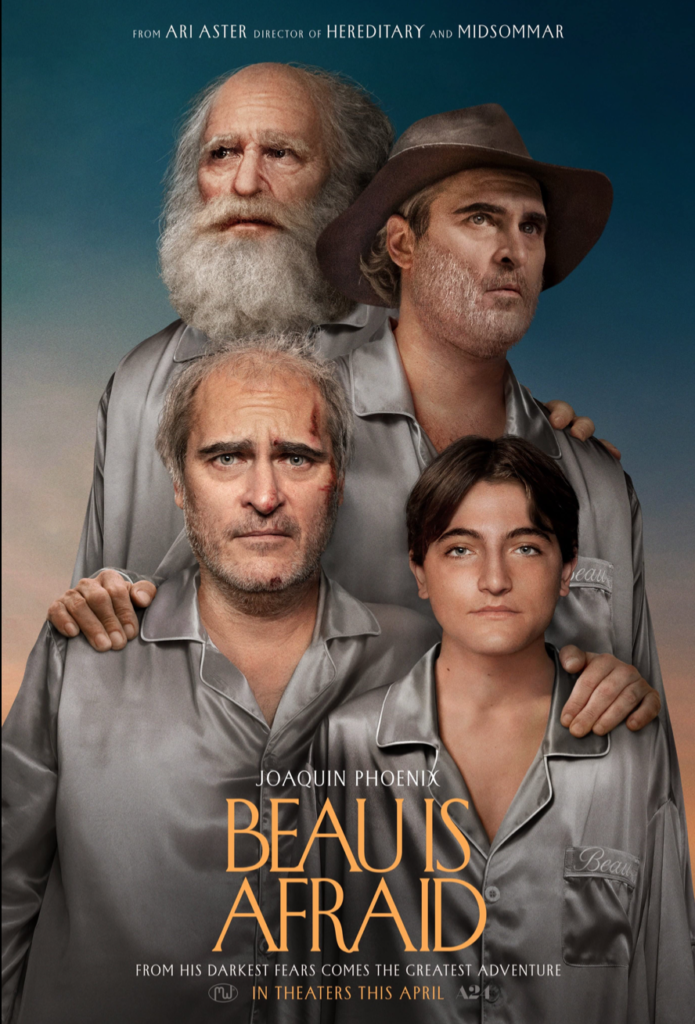
Billed often as horror or dark comedy, Beau is Afraid is a three-hour movie about a man who needs to visit his mother. It introduces us to Beau (Joaquin Phoenix), a middle aged man with abundant anxieties that seem fairly well placed, considering his street appears to be populated with vagrants who want to jump him and his empty apartment is plagued by a brown recluse spider. After disappointing his mother by missing his flight, he endures a nightmarish night only to be informed that his mother has been crushed by a chandelier. Distraught, Beau stumbles into an odyssey home, featuring a car accident, suspicious suburban caretakers, an ankle monitor, a pregnant wood-gatherer and a traveling theater troupe before he finally merely hitchhikes to his mother’s wake.
This is only the beginning of the delve into Beau’s complicated matriarchal relationship. Once at his mother’s home, the flashbacks we have seen that tease at Beau’s relationship with his mother, the legacy of his father, and the childhood crush he waited for start to manifest in unanticipated ways. As a film-goer, we might try to guess at what’s going to happen, but for Beau is Afraid I can confidently say I was wrong several times in my predictions, but never disappointed. There were questions left unanswered (most of which start with ‘why?‘) but this is one absurd film that still leaves the viewer with a simple summary: Beau had to visit his mother.
There are dozens of different things to talk about from this film, and while I agree with the consensus of other reviews that it was too long (by at least an hour) and perhaps too personalized to convey an otherwise universal message (mothers, amiright?), I think it’s also undeniable that Pheonix’s acting in the title role was thrilling to watch. As other wild and extreme characters (played by character powerhouses such as Nathan Lane, Amy Ryan and Parker Posey) come and go, I was constantly rocked by the constance of Beau-the-helpless, Beau-the-anxious, Beau-the, well…afraid. His boyish, whinging voice was a touchstone that anchored the arrested state of childhood even within his audaciously adult body.
What’s interesting to me is how the story manages to withhold our sympathy from Beau entirely. We can’t deny that Beau was a victim of something, or several things, but it doesn’t draw us closer to him. His mother remains functionally in the hero position, beloved by others, celebrated for her success, sitting in judgement over Beau…despite all the exposition we collect that might make her the villain, there is still a pull, even from Beau himself who recoils when reaching for her throat, that she is his mother and thus untouchable, inviolate, deserving of love. We just can’t blame a mother, we want something to be wrong with the child. This is the story of emotional abuse – the gaslighting and manipulation that Beau is both unaware of and drowning in – his neighbor’s unwarranted notes under the door, the cop who shoots at him instead of assisting, the surgeon refusing to take him home, the surgeon’s wife sending him unexplained secret messages, whatever is up with Elaine…and those are just the examples light on spoilers.
Despite all of that, this film still doesn’t want to save Beau. Like reality, there are too many unanswered questions, too many possible justifications, too many medications and a suspicious enjoyment of outdoor theater that leave us thrilled but wincing, scandalized but somehow still pointing the finger at Beau.
2023, directed by Ari Aster